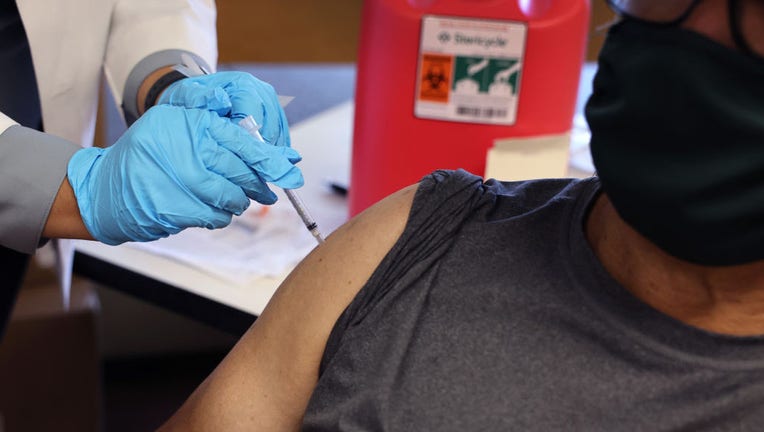Health officials encourage COVID-19 booster as Thanksgiving nears

FILE - A pharmacist gives a COVID-19 vaccine booster shot during an event hosted by the Chicago Department of Public Health at the Southwest Senior Center on Sept. 9, 2022 in Chicago, Illinois. The booster vaccine protects against the original SARS-C
For those planning to travel and gather around the table with loved ones for Thanksgiving, now may be the best time to roll up their sleeve and get an updated COVID-19 booster for the best protection, public health experts say.
In general, it’s shaping up to be a rough winter between an unusually early and harsh flu season, children's hospitals packed with another respiratory illness named RSV, and COVID-19 cases expected to rise with holiday gatherings.
Booster doses tweaked to target the most common omicron strain rolled out in early September, and recent data showed that Pfizer’s version significantly revved up adults’ virus-fighting antibodies. With many Americans reluctant to roll up their sleeves again, the U.S. Food and Drug Administration said the latest data — shared last week — should spur more people to get one ahead of Thanksgiving, which falls on Nov. 24.
Public health agencies across the country have echoed that message, encouraging people to get the shot.
"COVID-19 & flu vaccines take about 2 weeks to become fully effective. Take your shots now to be fully covered before your Thanksgiving celebrations," the Department of Public Health in Durham, North Carolina, tweeted.
"While we encouraged getting your #flu and #COVID19 boosters before Halloween to be ready for the holidays, it is NOT too late to get them now before Thanksgiving," Maricopa County Public Health in Arizona wrote on Twitter. "Try to get them two weeks before the holiday or before you travel for optimal effectiveness."
"Get your flu shot and updated COVID-19 booster so that you and your loved ones can be protected when you get together for the holiday," the New York City Department of Health echoed.
The original COVID-19 vaccines still offer strong protection against severe illness and death, especially among younger and healthier people who’ve gotten at least one booster — a reason for anyone who hasn't gotten their first set of shots to do so.
But public health experts say effectiveness drops as new mutants emerge and more time passes since someone’s last shot.
‘Bivalent’ booster dose meaning
Until September, COVID-19 vaccines targeted the original coronavirus strain, even as wildly different mutants emerged.
The new, tweaked boosters are combination, or "bivalent," shots.
They contain half that original vaccine recipe and half protection against the newest omicron versions, BA.4 and BA.5, which have been considered the most contagious yet.
Should I get the bivalent booster dose?
The CDC recommends that people ages 5 years and older receive one updated bivalent booster if it has been at least two months since their last COVID-19 vaccine dose, whether that was the primary series or the original booster dose.
But only about 26.3 million Americans — or less than 10% of the U.S. population — have gotten an updated booster since they rolled out in early September, according to the Centers for Disease Control and Prevention. Among those 65 and older, the figure increases to 23% of the population.
In its data shared last week, Pfizer said people 55 and older who got the omicron-targeting booster had four-fold higher antibody levels than those given an extra dose of the original vaccine.
A month after receiving the new booster, antibody levels in people 55 and older had jumped 13 times higher than before the extra dose. Younger adults saw a 9.5-fold jump, Pfizer and its partner BioNTech said. It had been about 11 months since the study participants’ last vaccination.
It’s too soon to know how much real-world protection the antibody boost translates into — and how long it will last. The results are preliminary, the study is still underway, and infection-fighting antibodies naturally wane over time.
The FDA cleared the updated boosters ahead of studies in people, a step toward eventually handling COVID-19 vaccine updates more like yearly changes to flu shots. It based the decision on studies of a similarly tweaked vaccine — against an earlier omicron strain — rather than the exact recipe.
So the new data "reassures us that this was a good decision to move to this bivalent vaccine," FDA vaccine chief Dr. Peter Marks told The Associated Press. "Right now is the time for people to consider going out and getting the updated" booster.
This story was reported from Cincinnati. The Associated Press contributed.

